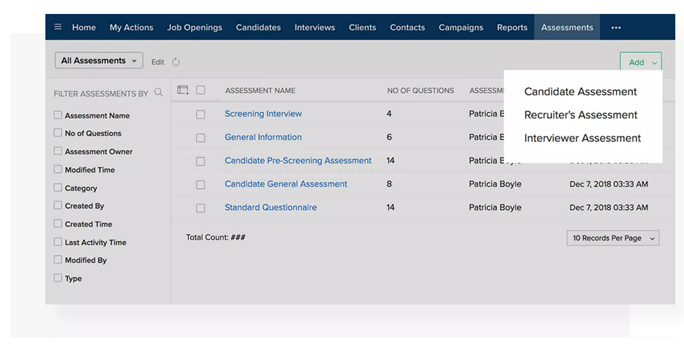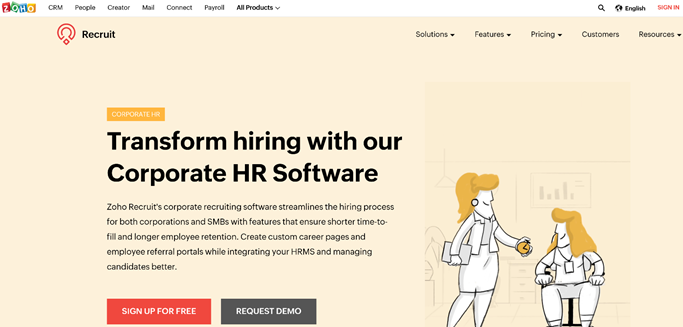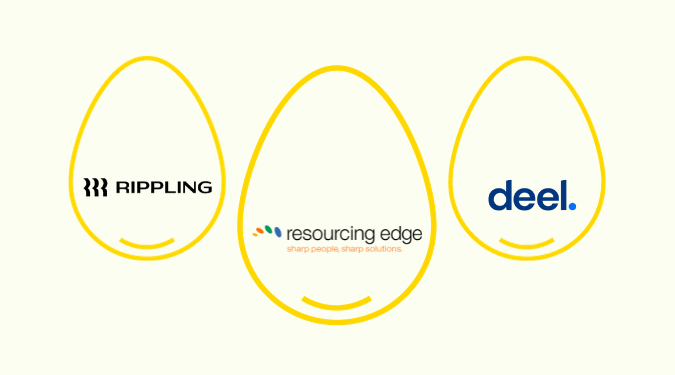Disclosure: This content is reader-supported, which means if you click on some of our links that we may earn a commission.
The most significant benefit of conducting a group interview is that it streamlines the hiring process and tests multiple candidates at once. Employers find these interviews need a lot of planning, though, and some find them daunting to carry out. Don’t worry: our guide will detail everything you need.
Why Conducting a Group Interview Is Worth It
Conducting a group interview comes with many benefits. For a start, if you’re on a tight deadline, group interviews help to fill open job positions quickly and efficiently. This method is advantageous when employers need to hire multiple people for the same position. They’re an affordable and fast option that saves your business resources and time.
Another key benefit of group interviews is that they test multiple candidates at once. Imagine you have many similar applicants; they’re hard to tell apart on paper, making your decision more difficult. Group interviews allow you to see who shines the brightest among them, compare applicants side by side, and get the answers to your questions from multiple applicants simultaneously, demonstrating how well they do under pressure. Group interviews also emphasize team-building and communication skills, letting you find the candidates with the strongest skill sets in those areas much more easily.
Group interviews also prevent biases from creeping in as they need to be conducted by several interviewers at once. Multiple people observing the same candidate and their behavior allow you to make a more informed and accurate decision about whether to hire them overall, increasing employee retention down the line and thereby boosting your business.
There’s less of a need to compare notes: what you see in front of you will be the deciding factor in most cases. This interview method does come with some drawbacks, but we’ll talk about those a little later in the guide.
For now, know that group interviews are great at reducing the time spent on interviews and the cost to hire and are a good opportunity to see some teamwork in action.
The Investment Needed To Conduct a Group Interview
Some employers worry about conducting group interviews as they need more planning before you reap the benefits. So while these styles of interviews do save you time, they also take longer to plan and require more thought. In a sense, you spend more time initially planning them than a regular interview but save time later on.
Ideally, a group interview is planned over multiple days, if not more, typically a week or two before the interview. Some employers don’t spend as much time preparing them as they should, leading to a chaotic interview where everyone talks over each other—this isn’t good for either the candidates or the employer.
You’ll also need to spend time meeting the other interviewers before the group interview. Doing so allows you to determine how the discussion will proceed on the day. In this meet-up, you’ll need to decide the questions to ask, who’s asking them, and how, ultimately, you’ll evaluate each candidate’s answer to them. Getting this structure right is pivotal, so be prepared to schedule time out for it.
Time commitments aside, it helps to have some dedicated HR software to back you up for a group interview. We spent time choosing the best software for our top picks and thought that Zoho Recruit was the best for recruiters. Zoho Recruit can help you set up your group interviews and starts at $22.50 per recruiter per month. You can try it out free for 15 days.

In summary, you’re going to need to schedule multiple days to plan a group interview, and it’s wise to invest in recruitment software to help you do so. Time and money are required, but correctly executed group interviews will save you both these commodities in the future.
5 Steps To Conduct a Group Interview
Here are five steps to successfully conduct a group interview. Let’s get started.
Step 1 – Notify the Interview Candidates
Some employers don’t notify candidates about a group interview until the day of the interview–or even the moment they walk in. That’s a really mean trick to play on prospective employees, and they won’t appreciate it whether you do it on purpose or by default. You need to make sure every candidate knows when the group interview is taking place well ahead of time, typically a week or so before the date.
The reason for this is because you need to allow candidates time to prepare appropriately for a different kind of interview. Group interviews can be stressful and more demanding than regular ones, so candidates need as much prep time as possible. The longer you give them, the better responses you’re going to get and the better the outcome of the interview.
Group interviews are longer than typical interviews with multiple questions to answer and usually a variety of activities. It’s a good idea to let them know who will be conducting the interview and the relevant positions—this gives them time to research and form their answers.
Zoho Recruit can be particularly useful here as it allows you to send out SMS text messages to notify candidates from the app alone. While emails are good, mobile text messages are better as candidates can receive notice wherever they are via their phones. Zoho Phonebridge even enables recruiters to make phone calls and send other reminders straight from the software.

If you prefer emails, Zoho Recruit can also send out these in bulk, notifying candidates that way as well. Whichever you pick, there’s no doubt HR software can help make the group interview process smoother.
Step 2 – Meet With the Other Interviewers
We mentioned the importance of meeting the other interviewers before a group interview. This step is essential as without meeting the interviewing team, you’ll have no idea of the format and how to proceed on the day.
Picture a team of interviewers sitting in front of a group of candidates, not knowing what to say or what order to ask questions. Imagine the awkward silence and confusion. Yes, it doesn’t make a good impression, and the candidates you’re trying to hire may even drop out as a result. Why would a candidate want to work for a company so disorganized? It only means problems in the future for them.
It’s worth keeping in mind that group interviews aren’t always the best for every personality type.
For example, introverts tend to perform better in one-on-one interviews, while group interviews tend to favor more extroverted individuals. There’s nothing wrong with having confidence, but you’ll need to ensure that the loudest in the room aren’t always dominating the discussion.
You shouldn’t decide the interview outcome on confidence alone—you may make a mistake and pick the wrong hire. Getting this wrong is a costly error, so a balanced interview is the order of the day.
For a positive outcome, be sure to sit down with the other interviewers and decide the order of the questions, how you’ll ask them, and who out of everyone will lead the interview. Having a chief interviewer will help guide the process and ensure the other interviewers themselves don’t talk over one another.
Keep in mind that all interviewers will have different priorities and areas they want to focus on in the group interview. The positions of each interviewer will mean they’ll want to ask several different questions to candidates. Freely discuss what those questions will be and how that will affect the structure of the group interview.

Zoho Recruit will handily store your questions for you, and everyone on the platform can comment and view these questions when they need them. It’s yet another valuable feature of the software.
Step 3 – Introduce Each Interviewer to Candidates
Fast forward to the big day. You’re sitting in the room with a nervous group of candidates and are ready to start the interview. But before you dive into the questions and other group activities, you need to ensure each interviewer properly introduces themselves to the candidates.
The interviewer’s introduction will need to include their name and position and why and how they’re involved in the interview.
You want to make candidates feel at ease first and foremost, but this also helps them to think about what each interviewer might be looking to see. They can cater their answers in response to this with more detail, and you’ll get the best possible group interview experience. Each company will have different roles and positions, but the principle remains the same.
You’ll need to shake hands with every candidate in the room, and be sure to smile to help ease the tension. Remember you were a candidate interviewing in front of people once, so don’t forget that and let the power go to your head.
It’s your job to create a good impression of the company during the interview, and candidates will perform better in turn.
Step 4 – Ask Questions in Turns
During the pre-meeting, you discussed what questions you would ask and in what order to your candidates.
Now the interview is here, so it’s vital that you ask these questions in turn and calmly. There have been cases of interviewers speaking over one another or asking the same questions in group interviews. Don’t allow this to happen, as it will affect the whole structure and the final results.
The person in charge of the interview, or the chosen lead interviewer, needs to act as a moderator to ensure questions don’t get asked simultaneously and that a friendly and efficient sequence of questions occurs.

At the end of the interview, you should ask a final round of questions, including any questions missed out the first time around. The ending part is also an excellent time to get any additional comments or information from candidates, but again, make sure things don’t descend into them talking over each other.
Step 5 – Evaluate the Candidates
The group interview is over and now comes the big debrief. This stage is crucial as you want to make sure you hire the best candidates for the positions in question.
Some companies will start talking about the candidates as soon as they leave the room, and while there is nothing wrong with this, a better approach is to take a quick break, allow thoughts to be processed, and come back later in the day. Don’t leave this evaluation too long, though, as you need to keep candidate responses and what happened fresh in your mind.
You can alleviate the problem of remembering who said what by taking notes, but recording group interviews doesn’t hurt either as it provides better accuracy. HR software like Zoho Recruit can help you record interviews and then discuss the results later, so it’s worth considering.
Using HR software will improve the overall efficiency of your evaluation and will ensure the best candidate gets picked. Be sure to get consent if you decide to record the interview—candidates need to be aware that you are recording them and potentially sharing videos on another platform.

Zoho Recruit is also able to help you process your assessments and candidate responses in a unified location. You’ll be able to rate the applicants out of five, leave notes and feedback from the interview, and use the platform to help make your final decision.
Next Steps
That’s how to conduct a group interview. Remember, you’ll feel the benefits of group interviews in the future more than anything, so put in the planning time first and reap the gains later.
Keep in mind group interviews will not always be the best choice for hiring. These interviews are not suitable for every personality type, require skilled interviewers to conduct, and need some planning to get right. That aside, don’t dismiss them, and be sure to use recruiting software to make the process easier.
If you need to reduce the time and cost to hire, want to overcome interviewing biases, and would like to see applicant’s skills in action, then group interviews are a solid choice.
If you’re thinking about the next steps to take, we recommend checking out these other guides:














